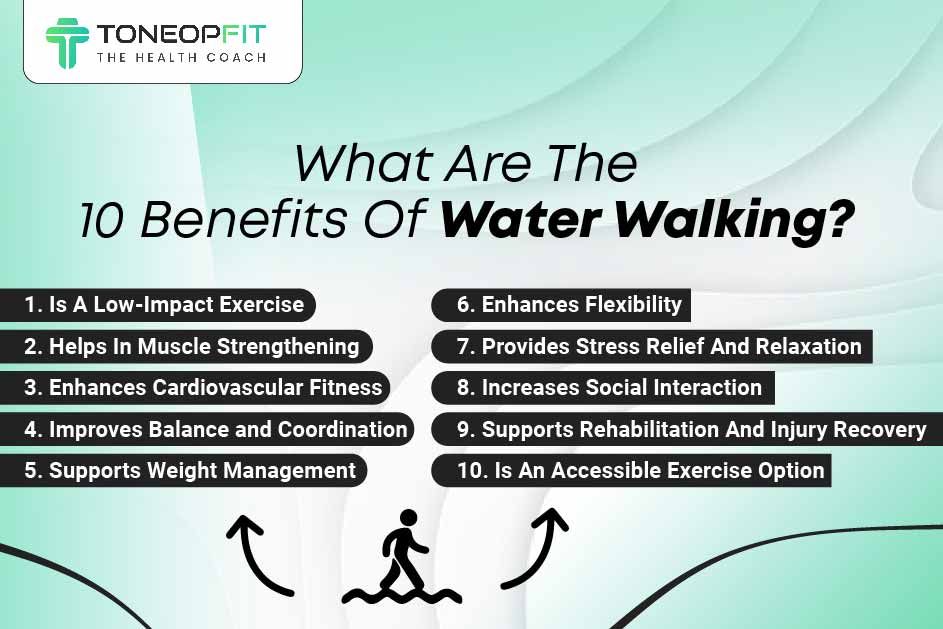Imagine yourself surrounded by crystal-clear water, with a gentle breeze cooling your skin, and a workout that feels like fun. This aquatic paradise isn’t just a daydream; it’s the reality of water walking—a low-impact exercise that’s as invigorating as it is effective.
You might think water walking sounds like a mystical ability to walk on water, but it’s actually a simple and structured exercise that’s less splashy and more accessible than it sounds. This workout offers a wealth of health benefits, making it a fantastic choice for people of all ages and fitness levels. Curious? Dive in with us to explore the 10 amazing benefits of water walking and see how this straightforward pool exercise routine can enhance your health!
What Is Water Walking?
Water walking is an exercise performed in shallow water, typically in a pool, where you simulate walking on land. Unlike swimming, it doesn’t require special equipment or advanced aquatic skills. You walk in place, mimicking your natural movement while the water provides gentle resistance. This added resistance engages more muscle groups compared to walking on land, and the water’s buoyancy alleviates pressure on your joints, making it a low-impact exercise that’s kind to your body. Water walking offers a refreshing way to boost your workout while enjoying the benefits of water.
What Are the 10 Benefits of Water Walking?
- Low-Impact Exercise
Water walking is gentle on the joints, making it ideal for those with arthritis, joint pain, or injuries. The water’s buoyancy minimizes strain on muscles and joints.
- Muscle Strengthening
Walking against water resistance helps build strength in muscles throughout the body, including legs, core, arms, and back.
- Cardiovascular Fitness
This exercise provides an effective cardiovascular workout, improving heart health, circulation, and stamina while potentially lowering blood pressure and reducing the risk of cardiovascular diseases.
- Balance and Coordination
Navigating the water’s resistance challenges your balance and coordination, which can improve stability and reduce fall risk, especially in older adults.
- Weight Management
Water walking burns calories and boosts metabolism. The water resistance intensifies the workout, aiding in calorie burning and fat loss.
- Flexibility
The buoyancy of water allows for greater joint motion, facilitating stretching and flexibility exercises, reducing stiffness, and enhancing mobility.
- Stress Relief
Exercising in water promotes relaxation and reduces stress, thanks to the soothing properties of water, which can alleviate anxiety and improve mood.
- Social Interaction
Water walking can be a group activity, offering social interaction and camaraderie, which contributes to a sense of community and well-being.
- Rehabilitation and Recovery
Often recommended in rehab programs, water walking supports gentle recovery and strengthens muscles and flexibility without straining the body.
- Accessibility
Suitable for all ages and fitness levels, water walking can be performed in various aquatic settings, making it an accessible exercise for many.
What Is a Deep Water Walking Exercise?
If you’re ready to make your fitness journey enjoyable, try deep water walking with the following guide:
- Warm-Up
Start with gentle movements like marching or jogging in chest-deep water to warm up your muscles.
- Deep Water Entry
Move to deeper water where you can’t touch the bottom, using a flotation device if needed.
- Engage Core Muscles
Stand tall, engage your core, and maintain stability.
- Walk in Place
Walk in place with high knees and natural arm movements, focusing on slow, controlled steps.
- Forward and Backward Walking
Alternate between walking forward and backward to engage different muscles and improve balance.
Pool Walking Exercise Regime
Beat the heat and stay fit this summer with this pool walking exercise regime:
- Warm-Up
Walk in the shallow end for 5-10 minutes to engage core muscles and maintain proper posture.
- Walk Forward
Move to the deeper end of the pool and walk forward, swinging your arms naturally.
- Focus on Form
Keep your back straight, shoulders relaxed, and gaze forward.
- High Knee Lifts
Lift your knees higher to engage core and hip flexors.
- Sideways Walking
Take lateral steps to work inner and outer thigh muscles.
Does Walking in the Pool Help with Knee Pain?
Water walking is excellent for managing knee pain:
1.Low-Impact
The buoyancy reduces pressure on knees, easing movement.
2.Muscle Strengthening
Builds muscle around the knees without stressing the joints.
3.Enhanced Circulation
Improves circulation to reduce inflammation and promote healing.
4.Safe and Effective
Provides a safe way to manage pain while improving mobility and function.
Walking in the Pool to Lose Weight
Water walking is an effective weight loss exercise:
1.Increased Calorie Burn
Water resistance boosts calorie expenditure.
2.Low-Impact:
Gentle on joints, suitable for all fitness levels.
3.Combined Benefits
Helps with calorie burning, metabolism, and overall weight loss when paired with a balanced diet and regular exercise.
The Final Say
Water walking is more than a poolside pastime; it’s a powerful way to enhance your well-being. It offers benefits like calorie burning, muscle building, and stress reduction. Combine it with other exercises for a well-rounded fitness routine. Enjoy the year-round accessibility of water walking, regardless of the weather.
About ToneOp Fit
ToneOp Fit is a platform dedicated to improving and maintaining good health through a comprehensive range of goal-oriented health plans with up to 3 Coach support. With a range of Weight Management, Medical Condition, Detox Plans, and Face Yoga Plans, the app also provides premium health trackers, recipes and health content. Get customized diet, fitness, naturopathy & yoga plans and transform yourself with ToneOp.
